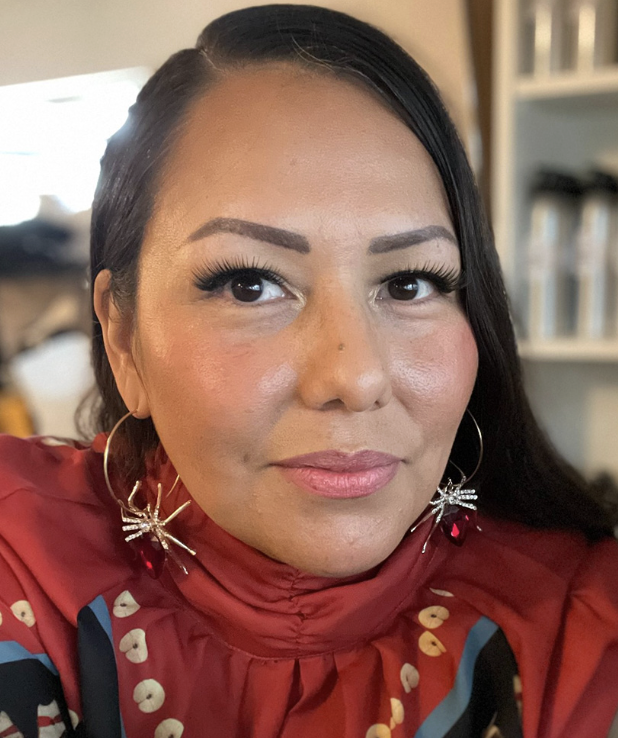Tipiziwin Tolman (Sihasapa & Hunkpapȟa Lakȟota; Wičhiyena & Tizaptaŋna Dakȟota), an enrolled member of the Standing Rock Sioux Tribe and a descendant of the Spirit Lake Dakota of North Dakota, has been appointed to the UNESCO Ad-hoc Group 2: Indigenous Language Transmission and Resilience Building, part of the Global Task Force for Making a Decade of Action for Indigenous Languages (IDIL2022–2032).

Tolman is from the Pretends Eagle, Yellow Lodge, and Half Skunk extended families of Standing Rock, and the Young and Longie families of Crow Hill at Spirit Lake, North Dakota. She and her husband, T Tolman, have six children and one grandchild, and reside in the homelands of the Nimiipuu people in eastern Washington.
A doctoral candidate in the Cultural Studies and Social Thought in Education Ph.D. program at Washington State University, Tolman earned a Bachelor of Science in Native American Studies from Sitting Bull College and a Master of Education in Indigenous Language Revitalization from the University of Victoria. She is a certified elementary educator in Washington State whose research focuses on Lakota and Dakota language pedagogy, literacy, and the intergenerational teachings embedded in her great-grandparents’ winter count. Her family also owns Haípažaža Pȟežuta, a business specializing in traditional Indigenous plant-based bath and body products.
Tolman’s appointment reflects her leadership in community-based language revitalization. Her work includes organizing international exchanges between Dakota and Lakota language communities and Māori language experts in Aotearoa (New Zealand), developing language pedagogy and literacy lessons drawn from her family’s winter count teachings, and promoting a praxis of peace for Indigenous language teachers to help disrupt the school-to-prison pipeline.
Tolman will join upcoming meetings of the Global Task Force to help shape international strategies for Indigenous language transmission and resilience.
“I’m honored to contribute to this global effort,” said Tolman. “Our languages carry the wisdom, laws, and lifeways of our people as learned from the land and water. This work is about ensuring that future generations inherit the strength of our ancestors’ voices.”
Audrey-Maude Perreault, Secretariat of the International Decade of Indigenous Languages, welcomed the appointment: “Tipiziwin Tolman’s expertise, experience, and commitment to advancing the objectives of the Global Action Plan of IDIL2022–2032 will make an invaluable contribution to the work of the group. We are confident that her participation will enrich the collective efforts to safeguard, support, and promote Indigenous languages worldwide.”
More Stories Like This
NCAI Passes Two Emergency Resolutions on Immigration Enforcement ActivitiesChickasaw Lighthorse Police Officer named Indian Country Law Enforcement Officer of the Year
Indian Gaming Association Rallies Broad Coalition Against Sports Event Contracts It Calls Illegal Threat to Tribal Sovereignty
Navajo Resources and Development Committee Issues Notice on Livestock Inspection Requirements
American Prairie, Tribal Coalition Files Protest Over Rescinded Grazing Rights
Help us defend tribal sovereignty.
At Native News Online, our mission is rooted in telling the stories that strengthen sovereignty and uplift Indigenous voices — not just at year’s end, but every single day.
Because of your generosity last year, we were able to keep our reporters on the ground in tribal communities, at national gatherings and in the halls of Congress — covering the issues that matter most to Indian Country: sovereignty, culture, education, health and economic opportunity.
That support sustained us through a tough year in 2025. Now, as we look to the year ahead, we need your help right now to ensure warrior journalism remains strong — reporting that defends tribal sovereignty, amplifies Native truth, and holds power accountable.
 The stakes couldn't be higher. Your support keeps Native voices heard, Native stories told and Native sovereignty defended.
The stakes couldn't be higher. Your support keeps Native voices heard, Native stories told and Native sovereignty defended.
Stand with Warrior Journalism today.
Levi Rickert (Potawatomi), Editor & Publisher

